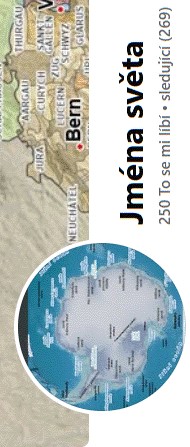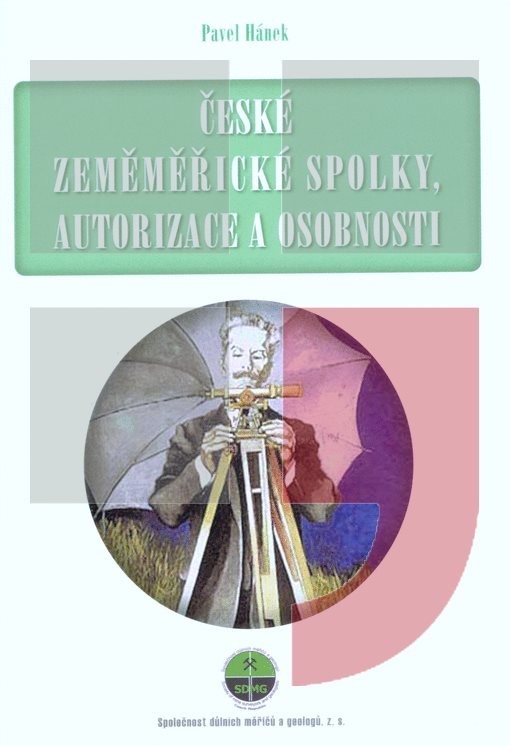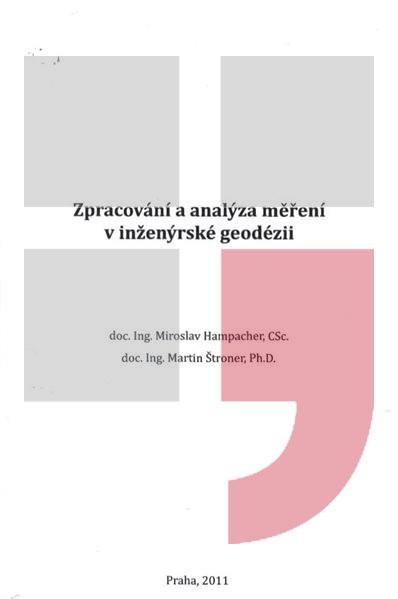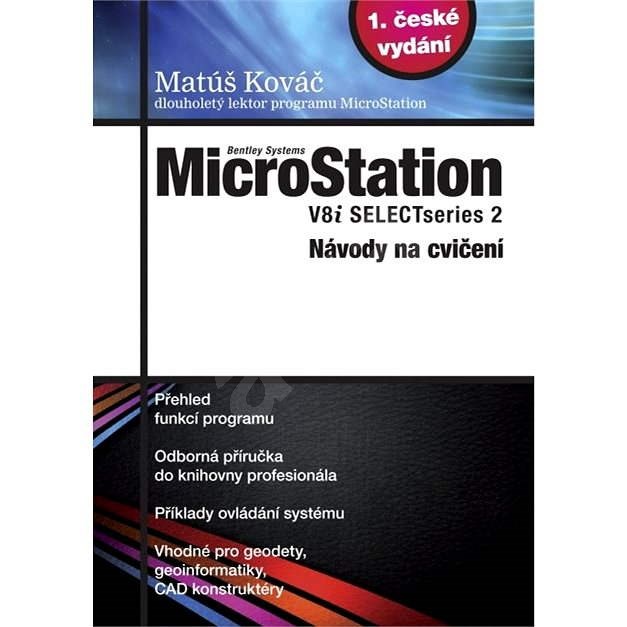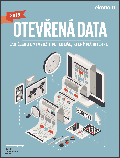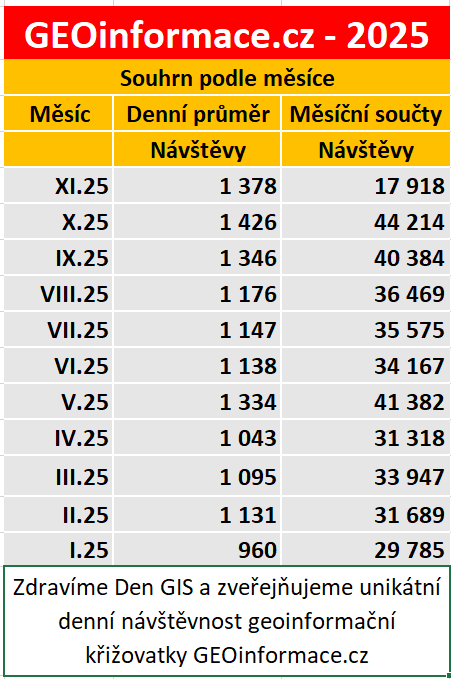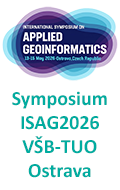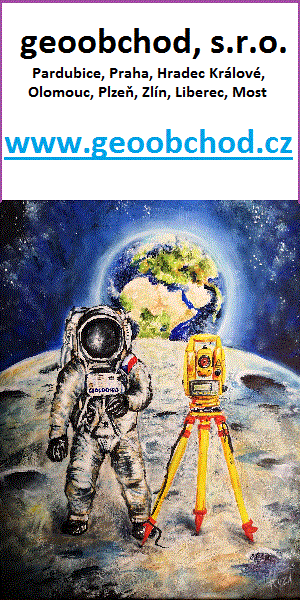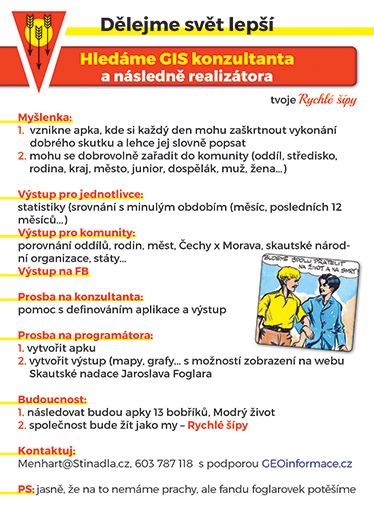ESA Navigation 
zdroje zpráv:
Next four Galileo satellites fuelled for launch
3.7.2018 12:55
Europe’s next four Galileo satellites have been fuelled at Europe’s Spaceport in Kourou, French Guiana, in preparation for their launch on 25 July.
Combined orbital Galileo-GPS position fix achieved aboard ISS
2.7.2018 8:05
Europe’s satellite navigation system Galileo is already in use worldwide, usable by itself or in combination with the US Global Positioning System (GPS). Now a combined Galileo–GPS positioning fix has been achieved in space – aboard the International Space Station – through an ESA–NASA collaboration.
ESA trainees compete in inaugural Galileo app contest
15.6.2018 13:33
ESA challenged its young graduate and national trainees to develop a smartphone app to perform satnav fixes using only Galileo satellites. Three teams developed apps in their spare time, presenting their results to a jury of experts from ESA, the European Global Navigation Satellite Systems Agency (GSA) and Google.
Galileo, inside out
7.6.2018 16:30
Technology image of the week: an entire Galileo satellite was taken apart then put back together on this test bench for laboratory testing
Galileo, inside out
7.6.2018 16:30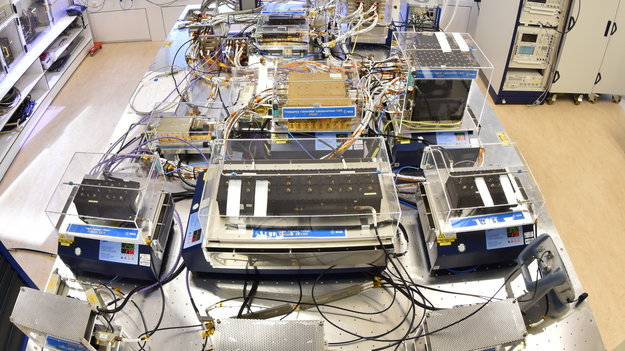
Technology image of the week: an entire Galileo satellite was taken apart then put back together on this test bench for laboratory testing
Galileo, inside out
7.6.2018 14:38
Technology image of the week: an entire Galileo satellite was taken apart then put back together on this test bench for laboratory testing
Next two Galileos plus launcher at Europe’s Spaceport for July launch
5.6.2018 13:08
Galileo satellites 25 and 26 have landed at Europe’s Spaceport in Kourou, French Guiana, joining their two predecessors ahead of their 25 July launch by Ariane 5.
Watch Galileo app contest
1.6.2018 9:25
ESA challenged its trainees to develop a smartphone app to perform Galileo-only satnav positioning. Watch the results today from 930 CEST
United Nations satnav specialists tour ESA’s technical heart
28.5.2018 11:16
Members of the United Nations technical group supporting global cooperation in satellite navigation toured ESA’s technical centre in the Netherlands, to see key facilities used to develop Europe’s Galileo system.
Unboxing Galileo
15.5.2018 14:04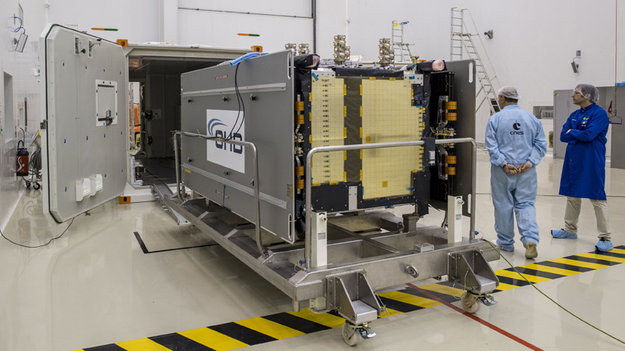
Galileo satellites 23 & 24 being unboxed in the Satellite Preparation Building after their 4 May 2018 arrival at Europe's Spaceport in Kourou, French Guiana
Satellite pair arrive for Galileo’s next rumble in the jungle
9.5.2018 9:37
The next two satellites in Europe’s Galileo satellite navigation system have arrived at Europe’s Spaceport in Kourou, French Guiana, ahead of their planned launch from the jungle space base in July.
Radio astronomers focus on ionosphere for sharper satellite navigation
13.4.2018 10:05
Radio astronomers and satellite navigation engineers are focusing their attention on the same point of the sky, looking into methods of improving both satnav accuracy and radio astronomy.
Navigate through satnav with the ESA–JRC Summer School
6.4.2018 10:16
This year’s ESA–Joint Research Centre International Summer School on Global Navigation Satellite Systems is taking place in July, in the spa resort of Loipersdorf, Austria.
The 10-day course will cover all aspects of satellite navigation, up to and including the development of a potential satnav-based business.
Participants will receive a full-spectrum overview of satellite navigation, starting from the theoretical basis of Global Navigation Satellite Systems, their signals and processing by receivers, and how the final ‘position–navigation–time’ solution is worked out. On the practical side, exercises will include receiving signals from Galileo and its fellow satnav systems.
World of Galileo
28.3.2018 15:30
Galileo’s initial services have been running for more than 15 months now: signals from the satellites in space are routinely serving users all across the world. The functioning of Galileo is dependent on a global network of ground stations, its current extent shown in the map here.
European industry has its say on Galileo’s post-2020 future
29.1.2018 13:31
With Europe’s Galileo satellite navigation system is only one launch away from full global coverage, representatives of European industry gathered at ESA’s centre in the Netherlands to discuss the transition towards the future Galileo Second Generation.
New technology version of EGNOS will harness Galileo for aviation
26.1.2018 12:55
The next generation of Europe’s satellite navigation overlay service, EGNOS, will combine use of GPS and Galileo signals to improve accuracy and robustness of navigation for air traffic and other uses where lives are at stake.
Galileo liftoff replay
13.12.2017 11:35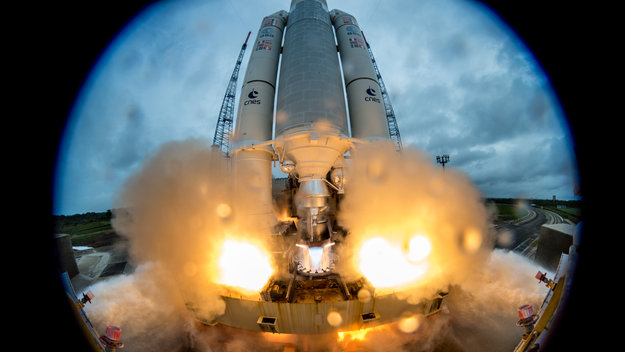
Rewatch the liftoff of Galileo satellites 19–22 by Ariane 5 from Europe's Spaceport in French Guiana on 12 December
Galileo launch brings navigation network close to completion
12.12.2017 23:22
Europe has four more Galileo navigation satellites in the sky following their launch on an Ariane 5 rocket. After today’s success, only one more launch remains before the Galileo constellation is complete and delivering global coverage.
Galileos in launch zone
12.12.2017 11:24
Galileos 19–22 rolled to their launch zone atop their Ariane 5 launcher during Monday afternoon, ready for today's launch
Galileo satellites atop rocket for next Tuesday’s flight
8.12.2017 14:10
Europe’s next four Galileo navigation satellites are in place atop their Ariane 5, ready to be launched next Tuesday.
Video: Galileos 19–22
5.12.2017 16:05
After a year of Galileo Initial Services, on 12 December an Ariane 5 will launch from Kourou with four new Galileo satellites, bringing the constellation a giant leap nearer completion
Call for Media: Galileo 19–22 ready for launch
5.12.2017 14:18
The next four Galileo satellites are scheduled for launch on 12 December at 18:36 GMT (19:36 CET, 15:36 local time) from Europe’s Spaceport in Kourou, French Guiana atop an Ariane 5 rocket.
Galileos on dispenser
4.12.2017 10:53
Europe's next four Galileo satellites 19–22 have met on their dispenser, then been transferred to the Final Assembly Building ahead of their Ariane 5 VA240 launch on 12 December
Galileos on dispenser
4.12.2017 10:53
Europe's next four Galileo satellites 19–22 have met on their dispenser, then been transferred to the Final Assembly Building ahead of their Ariane 5 VA240 launch on 12 December
Crossing drones with satellites: ESA eyes high-altitude aerial platforms
28.11.2017 10:37
ESA is considering extending its activities to a new region of the sky via a novel type of aerial vehicle, a ‘missing link’ between drones and satellites.
Galileo quartet fuelled and ready to fly
21.11.2017 16:05
Europe’s next four Galileo navigation satellites and the Ariane 5 rocket due to lift them into orbit are being readied for their 12 December launch from Europe’s Spaceport in Kourou, French Guiana.
Galileo in place for launch: then there were four
23.10.2017 16:20
Two more Galileo satellites have reached Europe’s Spaceport in French Guiana, joining the first pair of navigation satellites and the Ariane 5 rocket due to haul the quartet to orbit this December.
Galileo inside
18.10.2017 17:10
Technology image of the week: Europe’s Galileo satnav system at work on smartphones
Galileo pair arrives in French Guiana
2.10.2017 15:03
Europe’s next two Galileo navigation satellites have touched down in Europe’s Spaceport in French Guiana ahead of the launch of a quartet by Ariane 5 at the end of this year.
Galileos set to fly on Ariane 6
15.9.2017 14:17
Four of the latest set of Galileo navigation satellites will be launched on Ariane 6 rockets – ESA’s first contract to use Europe’s new vehicle.
Galileos set to fly on Ariane 6
15.9.2017 14:17
Four of the latest set of Galileo navigation satellites will be launched on Ariane 6 rockets – ESA’s first contract to use Europe’s new vehicle.
Last Galileo leaves ESA’s Test Centre
4.9.2017 14:57
The last of 22 Galileo satellites has departed ESA’s Test Centre in the Netherlands – concluding the single longest and largest scale test campaign in the establishment’s history.
Testing Galileo
31.7.2017 14:39
Each Galileo satellite must go through a rigorous test campaign to assure its readiness for space
Testing Galileo
31.7.2017 14:39
Each Galileo satellite must go through a rigorous test campaign to assure its readiness for space
Testing Galileo
31.7.2017 14:39
Each Galileo satellite must go through a rigorous test campaign to assure its readiness for space
How each Galileo satellite is tested ahead of launch
31.7.2017 14:00
Each Galileo satellite must go through a rigorous test campaign to assure its readiness for the violence of launch, airlessness and temperature extremes of Earth orbit.
Handover for team who put Galileo users on notice
18.7.2017 10:21
After four years of work, the ESA team tasked with keeping the world informed on the status of the Galileo satellite navigation system has formally passed on its responsibility to a European Union agency.
Testing Galileo
12.7.2017 14:39
Each Galileo satellite must go through a rigorous test campaign to assure its readiness for space
Another eight Galileo satellites for Europe
22.6.2017 10:38
Europe’s Galileo navigation constellation will gain an additional eight satellites, bringing it to completion, thanks to a contract signed today at the Paris Air and Space Show.
Galileo signal team wins European Inventor Award
16.6.2017 9:45
The invisible signals that Europe’s Galileo satellites are beaming down to the world are officially award-winning: the team behind their design has won the European Inventor Award, run by the European Patent Office.
Learn how ESA is seeking out competitive innovation in navigation: join us at Le Bourget
13.6.2017 13:13
ESA is seeking ideas for innovative future navigation concepts and products from European industry and academia – join us at the ESA pavilion at the Paris Air & Space Show on 19–20 June to talk with the team overseeing the new programme seeking to drive Europe’s state-of-the-art in finding one’s way.
Galileo grows: two more satellites join working constellation
8.6.2017 10:42
Two further satellites have formally become part of Europe’s Galileo satnav system, broadcasting timing and navigation signals worldwide while also picking up distress calls across the planet.
Contract to bring EGNOS to next level
6.6.2017 13:44
ESA has signed a contract with Thales Alenia Space for an upgrade of Europe’s EGNOS satellite navigation augmentation system, which underpins the safety-critical use of satnav across our continent.
Galileo Initial Services: first quarter service performance for users
2.6.2017 13:44
Europe’s Galileo satellite navigation system has undergone its first performance report since it started work at the end of last year – passing with flying colours.
Galileo signal team nominated for invention award
31.5.2017 17:05
The engineering team behind the signal technology underpinning Europe’s Galileo satellite navigation system has reached the final of this year’s European Inventor Award.
Galileo signal team nominated for invention award
31.5.2017 17:05
The engineering team behind the signal technology underpinning Europe’s Galileo satellite navigation system has reached the final of this year’s European Inventor Award, run by the European Patent Office.
Upgraded monitoring stations point way to better satnav-sharpening EGNOS
24.5.2017 9:07
Upgrades to the monitoring stations underpinning Europe’s EGNOS satnav augmentation system will support its evolution.
Galileo’s search and rescue service in the spotlight
6.4.2017 9:09
Europe’s Galileo satnav network does more than let us find our way – it is also helping to save lives. Today sees a spotlight cast on Galileo’s Search and Rescue service, which pinpoints people in distress on land or sea.
UK Galileo advocate receives honour
28.2.2017 9:53
A leading authority and advocate of Europe’s Galileo satellite navigation system has been named as an Officer of the Order of the British Empire by Her Majesty Queen Elizabeth II for services to science.
Northern exposure for satnav summer school
8.2.2017 10:37
This year’s ESA–Joint Research Centre International Summer School on Global Navigation Satellite Systems will be held in Longyearbyen, Svalbard-Spitsbergen, Norway, on 4–15 September, close to the world's northernmost Galileo station.
Galileo clock anomalies under investigation
19.1.2017 8:12
As first reported last November, anomalies have been noted in the atomic clocks serving Europe’s Galileo satellites.
Anomalies have occurred on five out of 18 Galileo satellites in orbit, although all satellites continue to operate well and the provision of Galileo Initial Services has not been affected.
Galileo clock anomalies under investigation
19.1.2017 8:12
As first reported last November, anomalies have been noted in the atomic clocks serving Europe’s Galileo satellites.
Father of GPS meets Europe’s Galileo team
17.1.2017 10:44
Brad Parkinson, hailed as the father of GPS, has visited ESA’s technical heart to meet the team behind Europe’s Galileo satellite navigation system.
Galileo: a new tool for science
21.12.2016 14:27
Last week’s start of Galileo’s initial services is a boon not just for people worldwide but also the scientific community. A precise yardstick is now freely available to study Earth and everything on it, along with the laws of physics.
Galileo goes live
15.12.2016 12:06
ESA Director General Jan Woerner joins representatives of the EC and GSA in Brussels to start Galileo Initial Services on 15 December
Galileo goes live
15.12.2016 12:06
ESA Director General Jan Woerner joins representatives of the EC and GSA in Brussels to start Galileo Initial Services on 15 December 2016
Galileo begins serving the globe
15.12.2016 9:29
Europe’s own Galileo satellite navigation system has begun operating, with the satellites in space delivering positioning, navigation and timing information to users around the globe.
Watch Galileo launch
11.12.2016 14:00
Follow the separation of Galileo satellites 19–22 live on Tuesday 12 December. Streaming resumes at 22:00 GMT (23:00 CET)
Watch Galileo launch
11.12.2016 14:00
Follow the launch of Galileo satellites 19–22 live on Tuesday 12 December. Streaming resumes at 22:00 GMT (23:00 CET)
Watch Galileo launch
11.12.2016 14:00
Follow the launch of Galileo satellites 19–22 live on Tuesday 12 December. Streaming resumes at 22:00 GMT (23:00 CET)
Watch Galileo launch
11.12.2016 14:00
See the launch of Galileo satellites 19–22 on Tuesday 12 December. Streaming starts at 18:10 GMT (1910 CET)
New Galileos join Europe’s satnav constellation
8.12.2016 10:22
Galileo satellites 13 and 14 have begun transmitting navigation signals as fully operational members of Europe’s satnav constellation.
Galileo timelapse
7.12.2016 10:51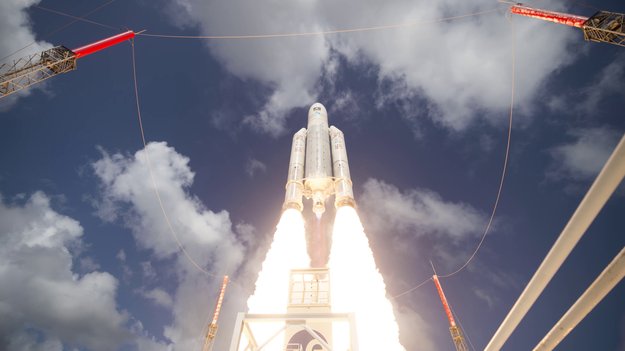
Timelapse video showing the Galileo satellites 15–18, from final preparations to liftoff on an Ariane 5 launcher
Galileo timelapse
7.12.2016 10:51
Timelapse video showing the Galileo satellites 15–18, from final preparations to liftoff on an Ariane 5 launcher
Green light for ESA’s advanced satnav technology and innovation programme
5.12.2016 11:04
With Europe’s Galileo satnav constellation soon to provide initial services, ESA is looking further ahead: its next-stage navigation research programme received strong backing during last week’s Council at Ministerial level.
EGNOS team receive prestigious award
2.12.2016 8:58
The multi-agency team behind the ESA-designed EGNOS augmentation system – making it possible for European aircraft to safely rely on satnav signals – has received a prestigious award from France’s national aerospace academy.
European EGNOS technology for South Korea
30.11.2016 10:53
Technology developed as part of Europe’s satellite navigation-augmenting EGNOS system has been sold to South Korea to serve its national equivalent system.
Galileo teamwork
23.11.2016 12:00
Operations image of the week: Mission control shepherds four Galileo satellites in orbit
Galileos taking flight
18.11.2016 13:39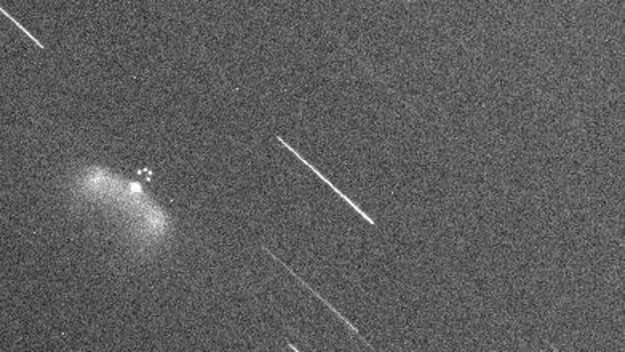
This remarkable CNES/CNRS telescopic image shows Galileos 15–18 moving away from their Ariane 5 EPS upper stage while it vents propellant
Galileos taking flight
18.11.2016 13:39
This remarkable CNES/CNRS telescopic image shows Galileos 15–18 moving away from their Ariane 5 EPS upper stage while it vents propellant
Galileo: 18 today
17.11.2016 18:53
Another four satellites join Europe's own satellite navigation system, launched for the first time by Ariane 5
Galileo replay part 1
17.11.2016 14:45
Replay the full coverage of the liftoff and early ascent of Europe’s next four Galileo satellites, which lifted off at 13:06 GMT (14:06 CET, 10:06 local time) on 17 November
Galileo liftoff replay
17.11.2016 14:13
Europe’s next four Galileo satellites lifted off at 13:06 GMT (14:06 CET, 10:06 local time) on 17 November from Europe’s Spaceport in French Guiana atop an Ariane 5 launcher
Galileo liftoff replay
17.11.2016 14:13
Europe’s next four Galileo satellites lifted off at 13:06 GMT (14:06 CET, 10:06 local time) on 17 November from Europe’s Spaceport in French Guiana atop an Ariane 5 launcher
Galileo liftoff replay
17.11.2016 14:13
Europe’s next four Galileo satellites lifted off at 13:06 GMT (14:06 CET, 10:06 local time) on 17 November from Europe’s Spaceport in French Guiana atop an Ariane 5 launcher
Launch of new Galileo navigation quartet
17.11.2016 13:17
An Ariane 5 rocket has launched four additional Galileo satellites, accelerating deployment of the new satellite navigation system.
Launch of new Galileo navigation quartet
17.11.2016 13:17
An Ariane 5 rocket has launched four additional Galileo satellites, accelerating deployment of the new satellite navigation system.
Galileo on the pad
17.11.2016 9:35
The latest pictures of the Ariane 5 carrying four Galileo satellites on its launch pad ahead of today's launch
Watch Galileo launch
15.11.2016 15:00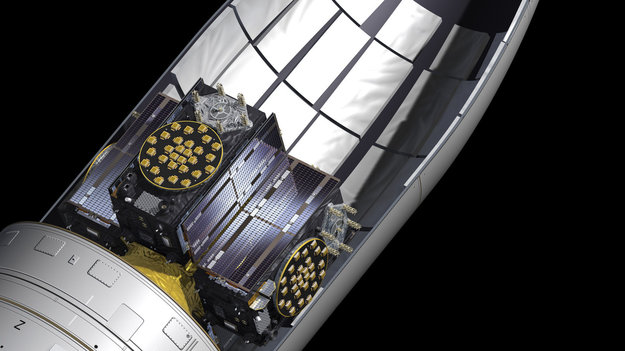
See the launch of Galileo satellites 15–18 today. Streaming starts at 12:36 GMT (13:36 CET)
Watch Galileo launch
15.11.2016 15:00
See the launch of Galileo satellites 15–18 today. Streaming resumes at 16:30 GMT (17:30 CET)
Watch Galileo launch
15.11.2016 15:00
See the launch of Galileo satellites 15–18 on Thursday 17 November. Streaming starts at 12:36 GMT (13:36 CET)
Four Galileo satellites on one Ariane 5
11.11.2016 15:46
Europe’s next four Galileo navigation satellites are together on their dispenser atop the Ariane 5 launcher due to launch them next Thursday from Europe’s Spaceport in French Guiana.
Flying the fantastic four
8.11.2016 16:00
This month, a single Ariane 5 rocket is set to propel four Galileo satellites into orbit for the navigation constellation’s first-ever quadruple launch. Mission controllers are training intensively for the complex space delivery.
Flying the fantastic four
8.11.2016 16:00
This month, a single Ariane 5 rocket is set to propel four Galileo satellites into orbit for the navigation constellation’s first-ever quadruple launch. Mission controllers are training intensively for the complex space delivery.
Galileo system status
8.11.2016 10:40
A video update on the 17 November Ariane 5 launch of four Galileo satellites, to bring the total number of European navigation satellites in orbit from 14 to 18
Galileos come together
1.11.2016 13:30
Europe's next four navigation satellites being integrated on their dispenser for their 17 November launch by Ariane 5
Galileo launcher on move
28.10.2016 10:51
Europe's first Ariane 5 ES Galileo variant rolled out to the Final Assembly Building of Europe's Spaceport on 26 November 2016 in preparation for its November 17 liftoff
Galileo's Ariane 5
14.10.2016 16:32
The Ariane 5 launcher that will lift four Galileo satellites into space next month is being assembled
EGNOS-based landings at Europe’s largest mainland airport
14.10.2016 11:42
The maiden commercial flight of the new Bombardier CS100 airliner this summer made use of the EGNOS satnav augmentation system for landing at Europe’s largest mainland airport.
Former Galileo Director honoured with satnav leadership award
27.9.2016 16:32
A panel of satnav experts at last week’s US Institute of Navigation’s annual Global Navigation Satellite System meeting has recognised ESA’s previous Director of the Galileo Programme and Navigation-related Activities for the work done to establish Galileo during his tenure.
Fantastic four: November’s Galileos reach Europe’s Spaceport
9.9.2016 10:41
A transatlantic flight delivered four Galileo satellites to French Guiana on Tuesday, in preparation for a shared launch this November by Ariane 5 – the first for Europe’s satnav constellation.
Fantastic four: November’s Galileos reach Europe’s Spaceport
9.9.2016 10:41
A transatlantic flight delivered four Galileo satellites to French Guiana on Tuesday, in preparation for a shared launch this November by Ariane 5 – the first for Europe’s satnav constellation.
Galileo’s Ariane 5 arrives at Europe’s Spaceport
30.8.2016 17:38
The first Ariane 5 rocket modified to carry four Galileo satellites into orbit has arrived at Europe’s Spaceport in French Guiana for a November launch.
Galileo’s Ariane 5 arrives at Europe’s Spaceport
30.8.2016 17:38
The first Ariane 5 rocket modified to carry four Galileo satellites into orbit has arrived at Europe’s Spaceport in French Guiana for a November launch.
Salvaged Galileos to help satnav specialists find their way
9.8.2016 8:11
Europe’s fifth and sixth Galileo satellites, which were salvaged from their faulty launch into working orbits, are set to begin broadcasting working navigation signals for test purposes.
Salvaged Galileos to help satnav specialists find their way
9.8.2016 8:11
Europe’s fifth and sixth Galileo satellites, which were salvaged from their faulty launch into working orbits, are set to begin broadcasting working navigation signals for test purposes.
Precision satnav in the far north
22.6.2016 10:44
A sea-based test is demonstrating the potential of extending satnav augmentation coverage into north polar regions, offering a safety-of-life standard of navigation performance to users including shipping or aircraft in flight.
Precision satnav in the far north
22.6.2016 10:44
A sea-based test is demonstrating the potential of extending satnav augmentation coverage into north polar regions, offering a safety-of-life standard of navigation performance to users including shipping or aircraft in flight.
Galileo’s Ariane 5 dispenser ready at spaceport
10.6.2016 11:35
Following rigorous testing in France and Germany, a new type of dispenser designed to carry four navigation satellites into orbit at once is now in French Guiana, in place for Galileo’s first Ariane 5 launch later this year.
Galileo’s Ariane 5 dispenser ready at spaceport
10.6.2016 11:35
Following rigorous testing in France and Germany, a new type of dispenser designed to carry four navigation satellites into orbit at once is now in French Guiana, in place for Galileo’s first Ariane 5 launch later this year.
14 and counting
24.5.2016 15:30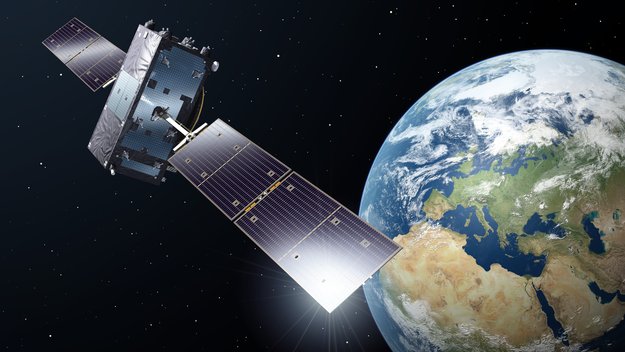
Europe now has 14 Galileo navigation satellites in orbit after its latest launch success
And yet it moves: 14 Galileo satellites now in orbit
24.5.2016 13:59
Named for the astronomer who pinpointed Earth’s true position in the Solar System, the Galileo satellite navigation system that will help Europe find its way in the 21st century now has 14 satellites in orbit after today’s double launch.
And yet it moves: 14 Galileo satellites now in orbit
24.5.2016 13:59
Named for the astronomer who pinpointed Earth’s true position in the Solar System, the Galileo satellite navigation system that will help Europe find its way in the 21st century now has 14 satellites in orbit after today’s double launch.
Galileo launch coverage
24.5.2016 11:40
Full replay of the launch and separation coverage of Europe's thirteenth and fourteenth Galileo satellites
Galileo launch coverage
24.5.2016 11:40
Full replay of the first part of the launch coverage of Europe's thirteen and fourteen Galileo satellites
Galileo launch coverage
24.5.2016 11:40
Full replay of the first part of the launch coverage of Europe's thirteen and fourteen Galileo satellites
Galileo liftoff replay
24.5.2016 11:00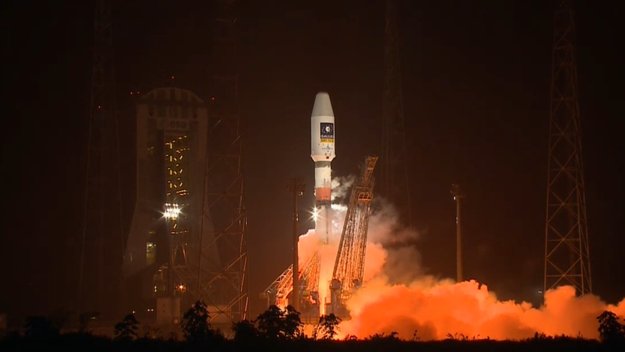
Europe's 13th and 14th Galileo satellites lifted off by Soyuz on 08:48 GMT - watch replay here
Galileo liftoff replay
24.5.2016 11:00
Europe's 13th and 14th Galileo satellites lifted off by Soyuz on 08:48 GMT - watch replay here
Galileo satellites enclosed for launch
20.5.2016 16:11
Europe’s latest Galileo satellites have been seen for the last time by human eyes. They were placed atop their upper stage then enclosed within their protective rocket fairing, ready for launch next Tuesday, 24 May.
Watch Galileo launch
20.5.2016 16:00
Follow the launch of Europe's 13th and 14 Galileo satellites on Tuesday 24 May, live from 10:28 CEST
Watch Galileo launch
20.5.2016 16:00
Follow the launch of Europe's 13th and 14 Galileo satellites this morning, live from 10:28 CEST
Watch Galileo separation
20.5.2016 16:00
Follow the separation of Europe's 13th and 14 Galileo satellites this afternoon, live from 14:23 CEST
Mission control ready for next Galileo pair
20.5.2016 11:15
A team of European mission control experts will be watching closely next week when two Galileo satellites are boosted into space, ready to shepherd the craft through the first critical days in orbit.
Joint team
19.5.2016 10:10
Operations Image of the week: Mission controllers gather for next week’s Galileo launch
Galileo's Fregat ready
19.5.2016 8:30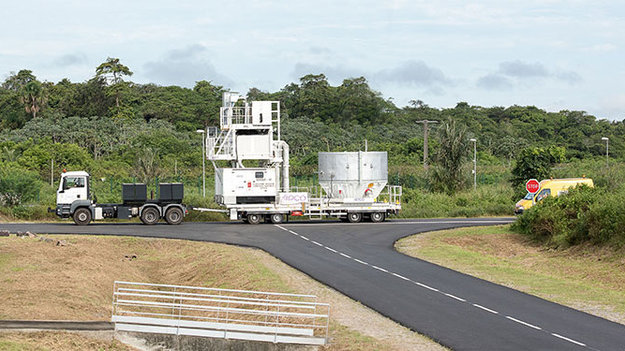
The upper stage for the launch of the 13th and 14th Galileo satellites has been fuelled, then transported to the Spaceport’s S3B clean room
Galileo rising
17.5.2016 11:03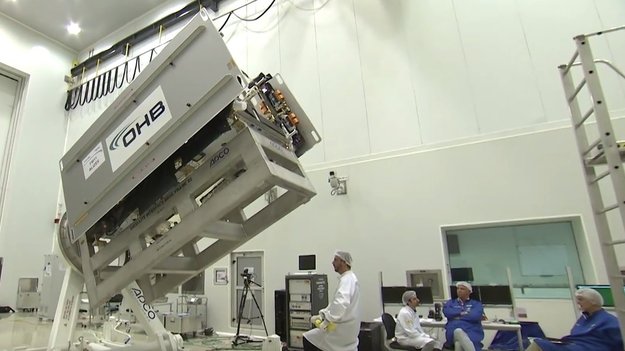
Video briefing on the next Galileo launch on 24 May, including views of the satellites and an interview with ESA's Navigation Director Paul Verhoef
Galileo seated for flight
13.5.2016 11:37
Europe's 13th Galileo satellite has been placed on its dispenser in preparation for its 24 May launch
Galileo satellites fuelled for flight
10.5.2016 14:26
Europe’s latest Galileo satellites have been filled with fuel in preparation for their joint launch on a Soyuz rocket from Europe’s Spaceport in French Guiana on 24 May.
Galileo satellites fuelled for flight
10.5.2016 14:26
Europe’s latest Galileo satellites have been filled with fuel in preparation for their joint launch on a Soyuz rocket from Europe’s Spaceport in French Guiana on 24 May.



